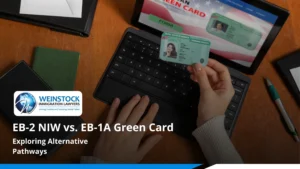Filing For Unemployment? Legal Immigrants Are Afraid
When the coronavirus hit, they found themselves among the millions suddenly jobless. Compounding this bad news was an unexpected anxiety: Is it safe to apply for unemployment?
“We were just wondering for a long time… how is it going to affect the green card application?” Alex said.
“Immigration-wise, I just don’t know if it would hurt me,” Raquel said.
Alex is a US Citizen, but Raquel is from Spain. We will just use first names in order to give examples of the most frequent cases we are seeing. Raquel and Alex are waiting for the U.S. government to decide whether to grant Raquel a green card. This piece of paper would turn her from a temporary visitor — a foreign student — into a permanent resident, extending her right to work and live with her husband in the United States.
Theirs is just one story out of dozens of legal immigrant workers, people earning a living and paying taxes in the U.S. yet fearful that collecting unemployment might jeopardize their immigration cases. Some were waiting on their first green cards; others were extending their residency or were even on the verge of becoming citizens.
We, at Weinstock Immigration Lawyers, are seeing a lot of clients who are eligible to apply for unemployment but are simply too afraid to do so.
At the heart of these worries is a new Trump administration policy, often called the “public charge” rule, which made it more difficult for immigrants to gain permanent resident status if it looks like they may need public assistance.
“I am tired of seeing our taxpayers paying for people to come into the country and immediately go onto welfare and various other things,” President Trump said while discussing the new rule in August.
But unemployment is not welfare. It is insurance, the costs of which are covered by workers and employers, not taxpayers. A spokesman for the U.S. Citizenship and Immigration Services told NPR that unemployment is an “earned benefit” that isn’t considered for the public charge review. In fact, the public charge rule is not written to apply for green card renewals or citizenship applications. We encourage worried workers to consult resources from groups such as the National Immigration Law Center or with their immigration attorneys.
“The perception is the problem, not the reality,” said Allen Orr, an executive at the American Immigration Lawyers Association. “The law has become so complex that — first, there’s a financial barrier of seeing an attorney. And then in the [news], you constantly hear you’re not welcome.”
Perception ran away from reality as the Trump administration consistently sought to restrict immigration, making big changes to rules. Immigrant workers point out that many things that did not count against them before now do.
Carolina came to the U.S.A from Dominican Republic to study industrial engineering. We will use only her first name because she is waiting on a renewal of her green card, hoping to apply for citizenship. She says she is worried that collecting unemployment will look bad. It would look like she’s asking America for money.
As many, Carolina prepared to come to the United States legally, She is not here to take advantage of anything.
Source: NPR.org
Related posts

Exploring Alternative Pathways: EB-2 NIW vs. EB-1A Green Card
Summary Two of the most sought-after green card options for highly qualified professionals are: EB-2 National Interest Waiver (NIW) EB-1A Extraordinary Ability visa Both allow

TN Visa for Remote or Hybrid Work: Navigating USMCA Rules
Summary If you’re a Canadian or Mexican entrepreneur living in the U.S. or planning to launch a business here, you may be wondering: Can I

Impact of USCIS Policy Updates on EB-2 NIW Petitions: What You Need to Know
Summary The EB-2 National Interest Waiver (NIW) offers a pathway to U.S. permanent residency without employer sponsorship, ideal for professionals and skilled workers. Recent USCIS
